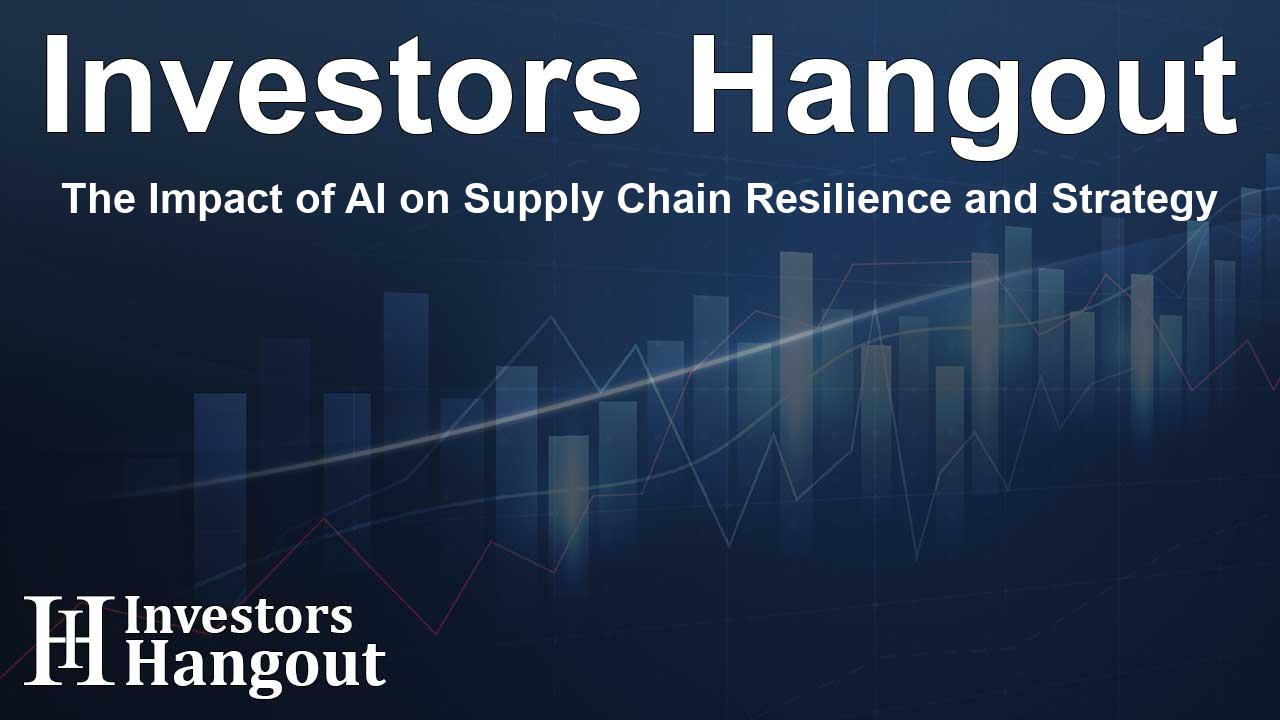The Impact of AI on Supply Chain Resilience and Strategy

AI's Role in Strengthening Supply Chains
In today’s rapidly evolving landscape, the adoption of Artificial Intelligence (AI) has emerged as a pivotal factor in enhancing the resilience of supply chains. The global economy faces increasing geopolitical disruptions, and organizations that embrace AI are better equipped to handle these uncertainties than those that do not.
Survey Insights on Supply Chain Preparedness
A recent survey focusing on U.S. supply chain leaders has provided compelling insights. The study reveals that 98% of organizations with fully deployed AI tools feel prepared for potential geopolitical risks. In stark contrast, companies that have yet to implement AI strategies report a concerning 0% preparedness in facing such disruptions. This highlights the critical need for businesses to adopt advanced technologies to stay competitive and resilient in an unpredictable world.
The Connection Between AI and Organizational Resilience
As businesses continue to navigate challenges, preparedness appears closely linked to innovation. Survey findings indicate that nearly half of the companies that have integrated AI into their operations describe themselves as very prepared for threats. In contrast, companies in the midst of AI implementation show a significant drop in preparedness, with only 21% feeling equipped to manage disruptions. This stark difference underscores the transformative power of AI in operational readiness.
Shifting Priorities in the Face of Challenges
While many organizations recognize the value of AI, external pressures, such as international instability and fluctuating trade policies, compel them to reassess their priorities. Amid these challenges, 77% of surveyed leaders are currently deploying AI tools for procurement and supply chain management. Surprisingly, only 36% of these leaders view AI as a top priority, suggesting a potential misalignment between recognizing the importance of technology and actual investment levels.
Balancing Cost Control and Innovation
The conversation around technological evolution in supply chains is not simply about adopting new tools; it’s about fostering an environment where control measures and innovation coexist. A notable 73% of executives agree on the importance of investing in technology to identify and mitigate potential geopolitical risks. However, 65% express concerns that ongoing trade policy uncertainties are hindering their investment plans.
Transformative Potential of AI in Business
Despite the hesitation stemming from restrictive economic conditions, a bright spot emerges: innovation is acclaimed as a priority by 59% of U.S. companies. As they find ways to navigate current setbacks, many leaders are not abandoning their transformation journeys but are adapting their timelines to effectively manage challenges while continuing to pursue growth.
Exploring AI's Competitive Advantages
Organizations equipped with mature AI strategies are significantly outperforming those that are not. For example, 78% of companies unprepared for geopolitical disruptions foresee profit declines from rising operational costs. This figure sharply decreases to 50% among firms that are well-prepared due to their advanced AI capabilities. Such statistics emphasize the importance of proactive planning and adaptation in today’s complex environment.
The Need for Clear Communication Across Teams
Interestingly, there's a marked discrepancy in perceptions of preparedness between the C-suite and frontline managers. While a substantial 67% of C-level executives claim their organizations are very prepared, only 17% of senior managers and a mere 10% of junior managers share this confidence. This gap highlights a crucial need for improved communication and alignment among various levels of an organization to succeed in implementing technology-driven strategies.
Conclusion: Innovation as a Risk Response
Ivalua’s research unveils that innovation should not be paused in the face of disruption. Instead, resilient organizations are leveraging transformation to close gaps in preparedness, strengthen their operations, and build competitive advantages during uncertain times. By embracing AI technologies, businesses are poised not only to survive but to thrive in a challenging global landscape.
Frequently Asked Questions
What key findings does the Ivalua survey reveal?
The survey indicates that 98% of organizations with AI tools feel prepared for geopolitical risks, compared to 0% of those without AI plans.
How does AI influence supply chain resilience?
AI enhances preparedness by enabling organizations to better adapt their strategies in response to disruptions and geopolitical risks.
Are companies prioritizing AI in their operations?
Despite 77% of companies rolling out AI tools, only 36% currently consider AI a top supply chain priority.
What challenges do businesses face while investing in AI?
Many businesses cite trade policy uncertainties and rising costs as reasons for pausing or adjusting their AI investments.
Why is communication essential within organizations regarding AI implementation?
Effective communication ensures alignment on preparedness levels, helping to bridge gaps between executive perceptions and operational realities.
About The Author
Contact Logan Wright privately here. Or send an email with ATTN: Logan Wright as the subject to contact@investorshangout.com.
About Investors Hangout
Investors Hangout is a leading online stock forum for financial discussion and learning, offering a wide range of free tools and resources. It draws in traders of all levels, who exchange market knowledge, investigate trading tactics, and keep an eye on industry developments in real time. Featuring financial articles, stock message boards, quotes, charts, company profiles, and live news updates. Through cooperative learning and a wealth of informational resources, it helps users from novices creating their first portfolios to experts honing their techniques. Join Investors Hangout today: https://investorshangout.com/
The content of this article is based on factual, publicly available information and does not represent legal, financial, or investment advice. Investors Hangout does not offer financial advice, and the author is not a licensed financial advisor. Consult a qualified advisor before making any financial or investment decisions based on this article. This article should not be considered advice to purchase, sell, or hold any securities or other investments. If any of the material provided here is inaccurate, please contact us for corrections.
